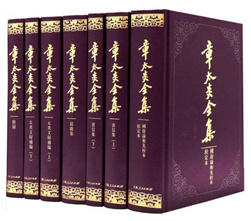Zhang Taiyan’s works: compilation across 40 years
Author : HUANG CHUNYU Source : Chinese Social Sciences Today 2017-11-22

A Collection of Zhang Taiyan’s Works
Author: Zhang Taiyan
Publisher: Shanghai People’s Publishing House
The long-lasting and arduous “marathon” has finally come to an end: the most comprehensive and sophisticated version of A Collection of Zhang Taiyan’s Works reached readers in 2017. Work began on the earliest parts of this compilation in 1979 and it was finally published after almost 40 years. Ma Yong, an expert in Chinese academic history, said “this is a great task of Chinese academic history. It is of equal importance to Confucius compiling the Six Classics. The publication is actually the most systematic compilation of traditional Chinese academic works.”
Zhang Taiyan (c.1869-1936), also known as Zhang Binglin, was a democracy revolutionist in the late Qing Dynasty. He was a celebrated scholar in many fields, particularly Chinese history, philosophy and politics. He was actively involved in the Hundred Days’ Reform in 1898, the Revolution of 1911, the Constitutional Protection Movement in 1917 and 1918, and the Chinese People’s War of Resistance against Japanese Aggression.
A master among traditional Chinese academics, Zhang made pioneering achievements in Confucian classics, Buddhism, philosophy, literature, history and medicine, building the cultural and discourse system of Chinese academics. Zhang Nianchi, Zhang’s grandson, said it’s hard to understand his grandfather’s sophisticated words. Even his political comments contain special terms and old-fashioned concepts. Variations in translated terms, names of people, book and articles complicated the interpretation of Zhang’ works. Wang Xingkang, from the Shanghai People’s Publishing House, compared Zhang’s knowledge to a mountain. Scholars spent 40 years editing the compilation so that more people can “climb the mountain.”
Zhang’s life experience left rich materials for research on Chinese history and politics. Throughout his life, he visited many places and made many friends, leaving a large number of letters. In his correspondences, one can find students, like Huang Kan, Qian Xuantong and Zhu Xizu; political figures, such as Li Hongzhang, Li Yuanhong and Sun Yat-sen; as well as scholars, like Hu Shi, Cai Yuanpei and Luo Zhenyu.
Many of Zhang’s descendants were involved in the compilation work. Zhang Nianchi, his grand-son, said most of the articles could be classified in volumes that required no extra collection work, with the exception of the articles on medicine, lectures and correspondence. These had to be collected from newspapers and magazines.
For the medicine volume alone, Zhang Nianchi spent eight years collecting all the articles from related libraries, museums, archives, memorial halls, and unpublished works preserved within his family. Also, knowing himself to be a layman, Zhang Nianchi invited many experts in Chinese medicine to participate in the editing and proofreading. In addition, compared with the medicine volume, the collection of Zhang’ lectures encountered more difficulties because the articles cover broader regions and a longer time span. Zhang Nianchi’s daughter said that her father worked until midnight every day. This high intensity workload continued for many years after his retirement.
Ye Shengtao made Chinese fairy tales from a wilderness
Ye Shengtao (1894–1988) created the first collection of fairy tales in the history of Chinese children’s literature...
-
How northern ethnicities integrated into Chinese nation
2023-09-18
-
Mogao caves
2023-09-12
-
Mogao Grottoes as ‘a place of pilgrimage’
2023-09-12
-
Time-honored architectural traditions in China
2023-08-29
-
Disentangling the civilizational evolution of China
2023-08-28
-
AI ethics in science fiction
2023-08-23














 2011-2013 by www.cssn.cn. All Rights Reserved
2011-2013 by www.cssn.cn. All Rights Reserved